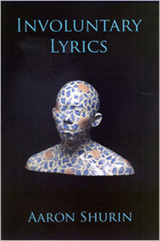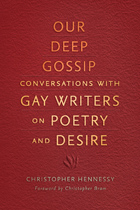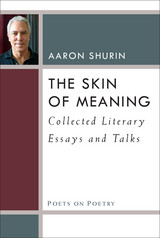3 books about Shurin, Aaron

Involuntary Lyrics
Aaron Shurin
Omnidawn, 2005
With Involuntary Lyrics, we see Aaron Shurin again at the vanguard of lyric eloquence and ethical rigor as he audaciously uses one of the seminal sonnet sequences in the history of English love poetry to extend the limits of current innovative practice. Shurin's position—the sharply etched immediacy of his experience—is unabashedly that of a sexually active gay man in contemporary America, yet—and, in fact, because of—the exactitude of his insights into this subject matter, the risks and revelations of his vision extend our own sense of what it means to be human. His deft reflections show us how much the involuntary expression of language is suffused with cultural intent, how much the rhythms of the past permeate the present—and how many lost friends, lovers, opportunities, can be heard in the music of the current moment, if we listen with the kind of lyric attention that Shurin brings to language. Formally, the poems in Involuntary Lyrics press every aspect of poem's surface tensions into the service of a music that extends our appreciation of the ways a poem can mean. Shurin shifts between the taut and the tangential in his elastic use of the line, but always deploying to full advantage the line's end as fulcrum to catch the shifting center within every poetic proposition. Because Shurin uses the end words from Shakespeare's sonnets, the cadence of these poems is charged with an elegiac longing, a classical resonance that only heightens the power of Shurin's socially conscious, subversively sensual subject matter. At each line's turn, Shurin balances the trace memory of poetic history against the charged physicality of contemporary event.
[more]

Our Deep Gossip
Conversations with Gay Writers on Poetry and Desire
Christopher Hennessy; Foreword by Christopher Bram
University of Wisconsin Press, 2013
From Walt Whitman forward, a century and a half of radical experimentation and bold speech by gay and lesbian poets has deeply influenced the American poetic voice. In Our Deep Gossip, Christopher Hennessy interviews eight gay men who are celebrated American poets and writers: Edward Field, John Ashbery, Richard Howard, Aaron Shurin, Dennis Cooper, Cyrus Cassells, Wayne Koestenbaum, and Kazim Ali. The interviews showcase the complex ways art and life intertwine, as the poets speak about their early lives, the friends and communities that shaped their work, the histories of gay writers before them, how sex and desire connect with artistic production, what coming out means to a writer, and much more.
While the conversations here cover almost every conceivable topic of interest to readers of poetry and poets themselves, the book is an especially important, poignant, far-reaching, and enduring document of what it means to be a gay artist in twentieth- and early twenty-first-century America.
[more]

The Skin of Meaning
Collected Literary Essays and Talks
Aaron Shurin
University of Michigan Press, 2016
A volume in the Poets on Poetry series, which collects critical works by contemporary poets, gathering together the articles, interviews, and book reviews by which they have articulated the poetics of a new generation.
In The Skin of Meaning, Aaron Shurin has collected thirty years’ worth of his provocative essays. Fueled by gender and queer studies and combined with radical traditions in poetry, Shurin’s essays combine a highly personal and lyrical vision with a trenchant social analysis of poetry’s possibilities. Whether he’s examining innovations in poetic form, analyzing the gestures of drag queens, or dissecting the language of AIDS, Shurin’s writing is evocative, his investigations rigorous, and his point of view unabashed.
Shurin’s poetic practice braids together many strands in contemporary, innovative writing, from the San Francisco Renaissance to Language Poetry and New Narrative Writing. His mentorships with Robert Duncan and Denise Levertov; his studies at New College of California, where he was the first graduate of the epochal Poetics Program; and his years of teaching writing provide a rich background for these essays. San Francisco provides the color and context for formulations of “prosody now,” propositions of textual collage, and theories of radical narrativity, while the heart of the book searches through the dire years of the AIDS epidemic to uncover poetic meaning, and “make the heroes heroes.”
[more]
READERS
Browse our collection.
PUBLISHERS
See BiblioVault's publisher services.
STUDENT SERVICES
Files for college accessibility offices.
UChicago Accessibility Resources
home | accessibility | search | about | contact us
BiblioVault ® 2001 - 2024
The University of Chicago Press









